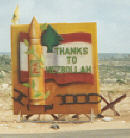Fatima Gate, Kfar Kila, South Lebanon – June 9th, 2000
The crack of the bullets is deafening. There is a lot of screaming and shouting. Chaos. A Palestinian boy has just been shot by the Israeli army on the other side of the border fence, literally yards from where we were standing. Hizbullah stewards, all dressed in black, carry the boy towards the main road. The boy’s mother is in hysterics, barely able to stand up. The boys crime? Throwing a rock over the fence into Israel.
This has become something of a national sport in Lebanon as convoys of families drive down from Beirut in order to peer over the fence into Israel. Israel has called the rock throwing a “violation of it’s security”. This is something of an overstatement as those doing the throwing have an average age of about seven. The whole area has something of a carnival atmosphere with vendors selling hotdogs and couples strolling hand in hand.
There was a feeling here that Hizbullah would retaliate following the shooting. It didn’t come, nor is any Hizbullah aggression likely. They are transforming themselves from a guerilla group to a well oiled political machine. Israel has promised to destroy Beirut’s infrastructure and economy should their Northern borders be attacked. Israel usually keeps such promises and mass destruction of their capital is not going to endear Hizbullah to the Lebanese electorate.
|
![]()
The South is very different from what I imagined. The press seemed sure that retaliation on a mass scale would follow the SLA’s collapse. This hasn’t happened yet. Hizbullah told us it won’t. The UN believes them. The people of the South hope they are right. So instead of the state of anarchy I expected, the villages seem eerily quiet. Old men sit in the shade sipping coffee, as children play chasing.
There is no real difference between the Christian and Muslim villages, apart from the flags that dot the horizon. The Hizbullah flags that cover the Muslim villages are replaced by Lebanese ones in the Christian areas. So there is a peace holding now and all the people here believe and hope it will stay that way.
